Essay: Global and Transnational Corruption and International Efforts
VerifiedAdded on 2022/11/24
|6
|2650
|478
Essay
AI Summary
This essay provides a comprehensive analysis of corruption at both the global and transnational levels, defining it as the exploitation of power for private gain and highlighting its detrimental effects on economic growth, human rights, and overall societal development. It explores various forms of corruption, including bribery and commercial favoritism, and examines the involvement of powerful entities and the challenges posed by political dilemmas. The essay details the historical evolution of the fight against global corruption, emphasizing the roles of international organizations like the UN, IMF, and OECD in establishing anti-corruption laws, conventions, and codes of conduct. It further discusses the role of tax havens and the challenges in eradicating corruption. The essay then outlines the various efforts made by governments and international organizations to curb corruption, such as government-to-government deals, open bidding systems, and the strengthening of anti-corruption laws. It also suggests further measures, including promoting e-governance, establishing independent regulatory authorities, empowering media, and protecting whistleblowers, to effectively combat corruption at an international level. The essay emphasizes the need for a multi-faceted approach involving international cooperation, technological advancements, and legal reforms to address this pervasive issue.
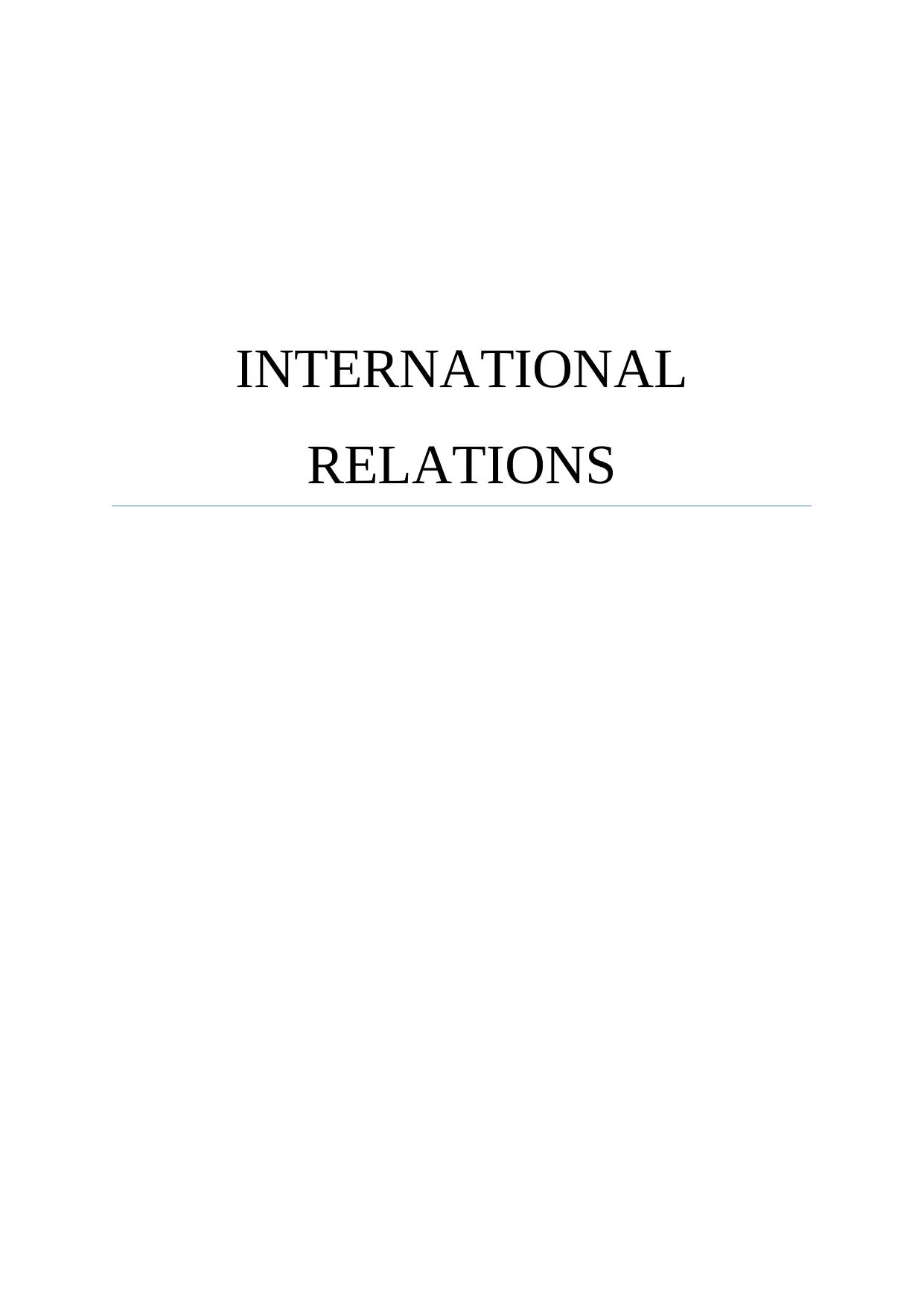
INTERNATIONAL
RELATIONS
RELATIONS
Paraphrase This Document
Need a fresh take? Get an instant paraphrase of this document with our AI Paraphraser
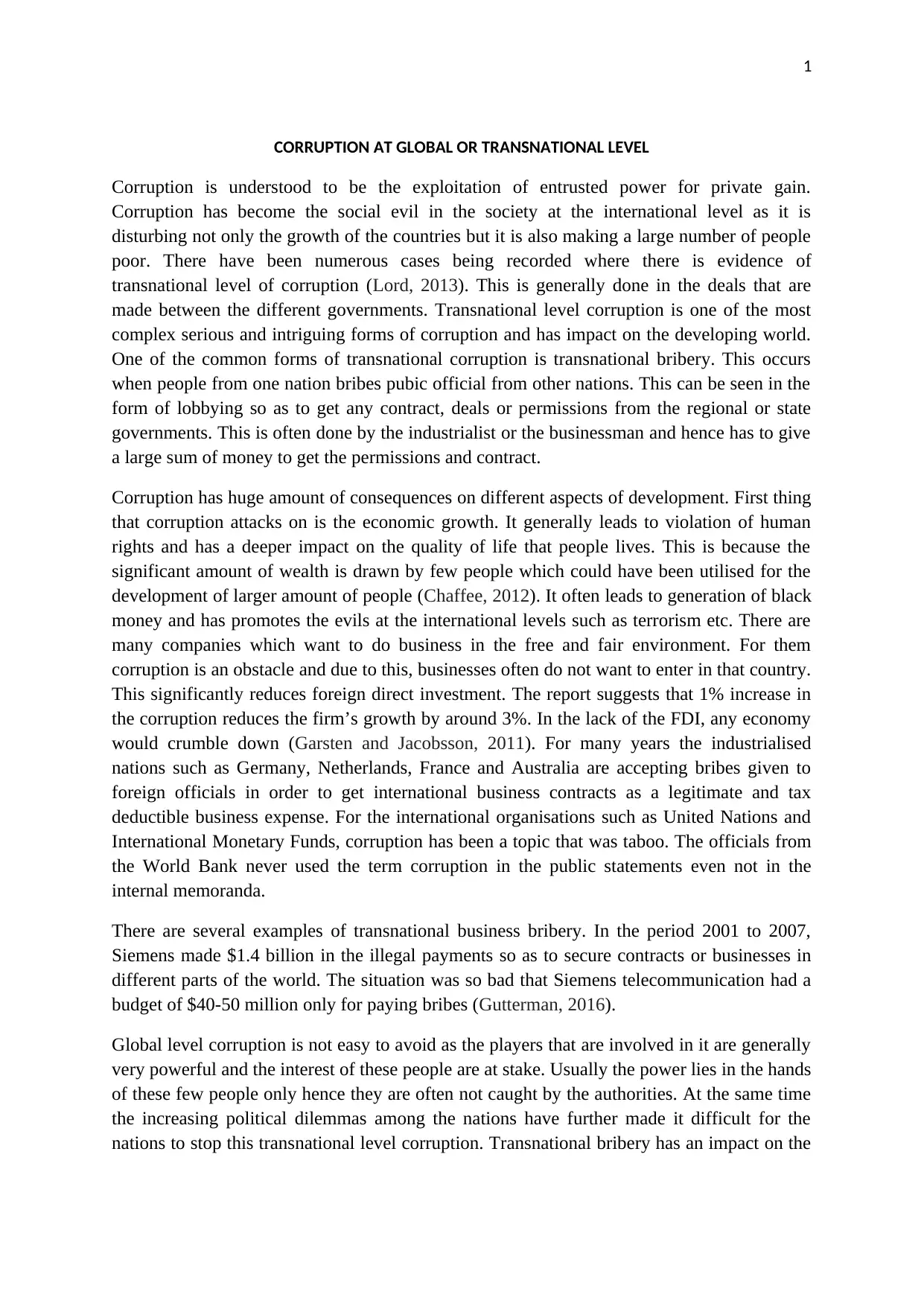
1
CORRUPTION AT GLOBAL OR TRANSNATIONAL LEVEL
Corruption is understood to be the exploitation of entrusted power for private gain.
Corruption has become the social evil in the society at the international level as it is
disturbing not only the growth of the countries but it is also making a large number of people
poor. There have been numerous cases being recorded where there is evidence of
transnational level of corruption (Lord, 2013). This is generally done in the deals that are
made between the different governments. Transnational level corruption is one of the most
complex serious and intriguing forms of corruption and has impact on the developing world.
One of the common forms of transnational corruption is transnational bribery. This occurs
when people from one nation bribes pubic official from other nations. This can be seen in the
form of lobbying so as to get any contract, deals or permissions from the regional or state
governments. This is often done by the industrialist or the businessman and hence has to give
a large sum of money to get the permissions and contract.
Corruption has huge amount of consequences on different aspects of development. First thing
that corruption attacks on is the economic growth. It generally leads to violation of human
rights and has a deeper impact on the quality of life that people lives. This is because the
significant amount of wealth is drawn by few people which could have been utilised for the
development of larger amount of people (Chaffee, 2012). It often leads to generation of black
money and has promotes the evils at the international levels such as terrorism etc. There are
many companies which want to do business in the free and fair environment. For them
corruption is an obstacle and due to this, businesses often do not want to enter in that country.
This significantly reduces foreign direct investment. The report suggests that 1% increase in
the corruption reduces the firm’s growth by around 3%. In the lack of the FDI, any economy
would crumble down (Garsten and Jacobsson, 2011). For many years the industrialised
nations such as Germany, Netherlands, France and Australia are accepting bribes given to
foreign officials in order to get international business contracts as a legitimate and tax
deductible business expense. For the international organisations such as United Nations and
International Monetary Funds, corruption has been a topic that was taboo. The officials from
the World Bank never used the term corruption in the public statements even not in the
internal memoranda.
There are several examples of transnational business bribery. In the period 2001 to 2007,
Siemens made $1.4 billion in the illegal payments so as to secure contracts or businesses in
different parts of the world. The situation was so bad that Siemens telecommunication had a
budget of $40-50 million only for paying bribes (Gutterman, 2016).
Global level corruption is not easy to avoid as the players that are involved in it are generally
very powerful and the interest of these people are at stake. Usually the power lies in the hands
of these few people only hence they are often not caught by the authorities. At the same time
the increasing political dilemmas among the nations have further made it difficult for the
nations to stop this transnational level corruption. Transnational bribery has an impact on the
CORRUPTION AT GLOBAL OR TRANSNATIONAL LEVEL
Corruption is understood to be the exploitation of entrusted power for private gain.
Corruption has become the social evil in the society at the international level as it is
disturbing not only the growth of the countries but it is also making a large number of people
poor. There have been numerous cases being recorded where there is evidence of
transnational level of corruption (Lord, 2013). This is generally done in the deals that are
made between the different governments. Transnational level corruption is one of the most
complex serious and intriguing forms of corruption and has impact on the developing world.
One of the common forms of transnational corruption is transnational bribery. This occurs
when people from one nation bribes pubic official from other nations. This can be seen in the
form of lobbying so as to get any contract, deals or permissions from the regional or state
governments. This is often done by the industrialist or the businessman and hence has to give
a large sum of money to get the permissions and contract.
Corruption has huge amount of consequences on different aspects of development. First thing
that corruption attacks on is the economic growth. It generally leads to violation of human
rights and has a deeper impact on the quality of life that people lives. This is because the
significant amount of wealth is drawn by few people which could have been utilised for the
development of larger amount of people (Chaffee, 2012). It often leads to generation of black
money and has promotes the evils at the international levels such as terrorism etc. There are
many companies which want to do business in the free and fair environment. For them
corruption is an obstacle and due to this, businesses often do not want to enter in that country.
This significantly reduces foreign direct investment. The report suggests that 1% increase in
the corruption reduces the firm’s growth by around 3%. In the lack of the FDI, any economy
would crumble down (Garsten and Jacobsson, 2011). For many years the industrialised
nations such as Germany, Netherlands, France and Australia are accepting bribes given to
foreign officials in order to get international business contracts as a legitimate and tax
deductible business expense. For the international organisations such as United Nations and
International Monetary Funds, corruption has been a topic that was taboo. The officials from
the World Bank never used the term corruption in the public statements even not in the
internal memoranda.
There are several examples of transnational business bribery. In the period 2001 to 2007,
Siemens made $1.4 billion in the illegal payments so as to secure contracts or businesses in
different parts of the world. The situation was so bad that Siemens telecommunication had a
budget of $40-50 million only for paying bribes (Gutterman, 2016).
Global level corruption is not easy to avoid as the players that are involved in it are generally
very powerful and the interest of these people are at stake. Usually the power lies in the hands
of these few people only hence they are often not caught by the authorities. At the same time
the increasing political dilemmas among the nations have further made it difficult for the
nations to stop this transnational level corruption. Transnational bribery has an impact on the
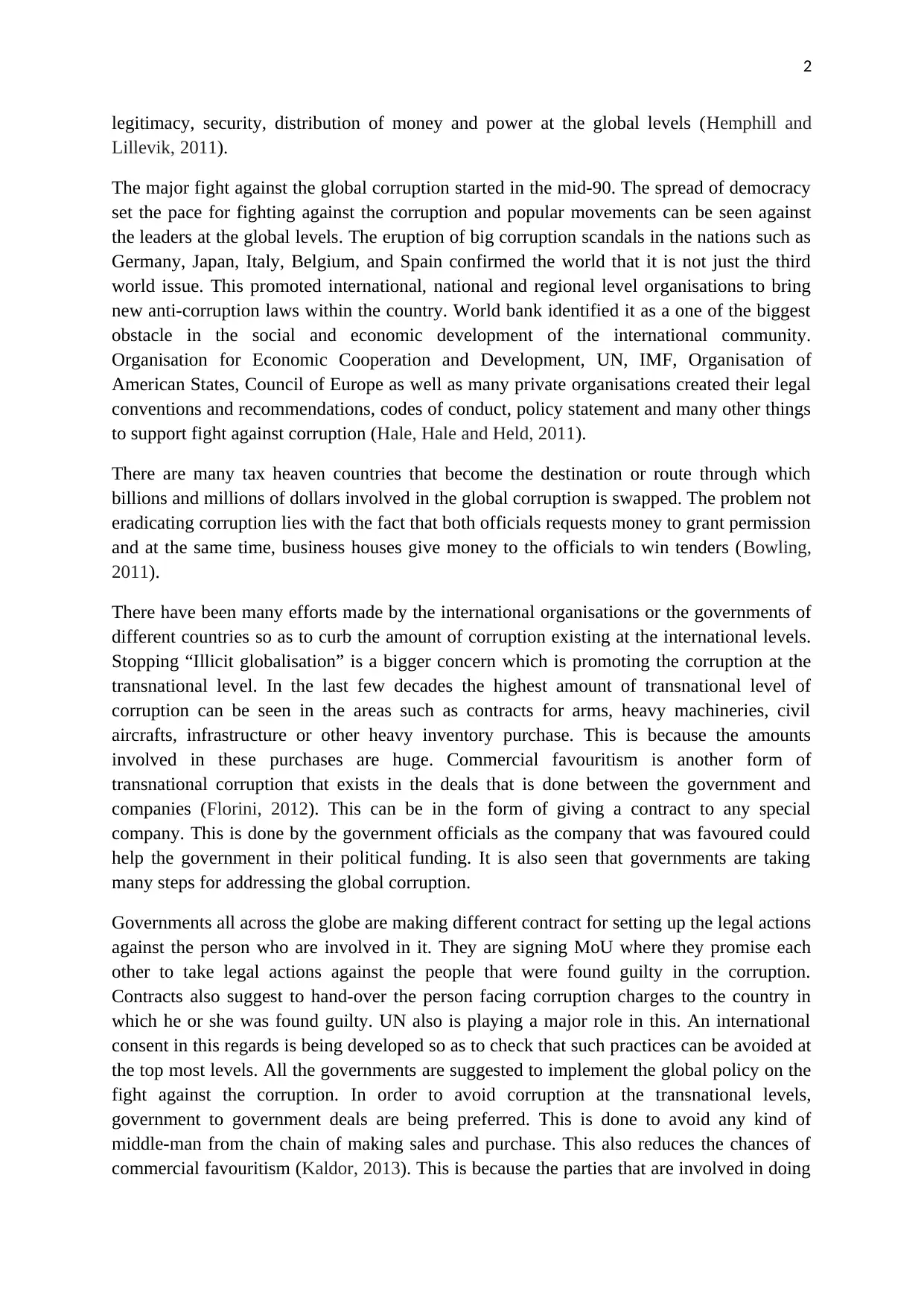
2
legitimacy, security, distribution of money and power at the global levels (Hemphill and
Lillevik, 2011).
The major fight against the global corruption started in the mid-90. The spread of democracy
set the pace for fighting against the corruption and popular movements can be seen against
the leaders at the global levels. The eruption of big corruption scandals in the nations such as
Germany, Japan, Italy, Belgium, and Spain confirmed the world that it is not just the third
world issue. This promoted international, national and regional level organisations to bring
new anti-corruption laws within the country. World bank identified it as a one of the biggest
obstacle in the social and economic development of the international community.
Organisation for Economic Cooperation and Development, UN, IMF, Organisation of
American States, Council of Europe as well as many private organisations created their legal
conventions and recommendations, codes of conduct, policy statement and many other things
to support fight against corruption (Hale, Hale and Held, 2011).
There are many tax heaven countries that become the destination or route through which
billions and millions of dollars involved in the global corruption is swapped. The problem not
eradicating corruption lies with the fact that both officials requests money to grant permission
and at the same time, business houses give money to the officials to win tenders (Bowling,
2011).
There have been many efforts made by the international organisations or the governments of
different countries so as to curb the amount of corruption existing at the international levels.
Stopping “Illicit globalisation” is a bigger concern which is promoting the corruption at the
transnational level. In the last few decades the highest amount of transnational level of
corruption can be seen in the areas such as contracts for arms, heavy machineries, civil
aircrafts, infrastructure or other heavy inventory purchase. This is because the amounts
involved in these purchases are huge. Commercial favouritism is another form of
transnational corruption that exists in the deals that is done between the government and
companies (Florini, 2012). This can be in the form of giving a contract to any special
company. This is done by the government officials as the company that was favoured could
help the government in their political funding. It is also seen that governments are taking
many steps for addressing the global corruption.
Governments all across the globe are making different contract for setting up the legal actions
against the person who are involved in it. They are signing MoU where they promise each
other to take legal actions against the people that were found guilty in the corruption.
Contracts also suggest to hand-over the person facing corruption charges to the country in
which he or she was found guilty. UN also is playing a major role in this. An international
consent in this regards is being developed so as to check that such practices can be avoided at
the top most levels. All the governments are suggested to implement the global policy on the
fight against the corruption. In order to avoid corruption at the transnational levels,
government to government deals are being preferred. This is done to avoid any kind of
middle-man from the chain of making sales and purchase. This also reduces the chances of
commercial favouritism (Kaldor, 2013). This is because the parties that are involved in doing
legitimacy, security, distribution of money and power at the global levels (Hemphill and
Lillevik, 2011).
The major fight against the global corruption started in the mid-90. The spread of democracy
set the pace for fighting against the corruption and popular movements can be seen against
the leaders at the global levels. The eruption of big corruption scandals in the nations such as
Germany, Japan, Italy, Belgium, and Spain confirmed the world that it is not just the third
world issue. This promoted international, national and regional level organisations to bring
new anti-corruption laws within the country. World bank identified it as a one of the biggest
obstacle in the social and economic development of the international community.
Organisation for Economic Cooperation and Development, UN, IMF, Organisation of
American States, Council of Europe as well as many private organisations created their legal
conventions and recommendations, codes of conduct, policy statement and many other things
to support fight against corruption (Hale, Hale and Held, 2011).
There are many tax heaven countries that become the destination or route through which
billions and millions of dollars involved in the global corruption is swapped. The problem not
eradicating corruption lies with the fact that both officials requests money to grant permission
and at the same time, business houses give money to the officials to win tenders (Bowling,
2011).
There have been many efforts made by the international organisations or the governments of
different countries so as to curb the amount of corruption existing at the international levels.
Stopping “Illicit globalisation” is a bigger concern which is promoting the corruption at the
transnational level. In the last few decades the highest amount of transnational level of
corruption can be seen in the areas such as contracts for arms, heavy machineries, civil
aircrafts, infrastructure or other heavy inventory purchase. This is because the amounts
involved in these purchases are huge. Commercial favouritism is another form of
transnational corruption that exists in the deals that is done between the government and
companies (Florini, 2012). This can be in the form of giving a contract to any special
company. This is done by the government officials as the company that was favoured could
help the government in their political funding. It is also seen that governments are taking
many steps for addressing the global corruption.
Governments all across the globe are making different contract for setting up the legal actions
against the person who are involved in it. They are signing MoU where they promise each
other to take legal actions against the people that were found guilty in the corruption.
Contracts also suggest to hand-over the person facing corruption charges to the country in
which he or she was found guilty. UN also is playing a major role in this. An international
consent in this regards is being developed so as to check that such practices can be avoided at
the top most levels. All the governments are suggested to implement the global policy on the
fight against the corruption. In order to avoid corruption at the transnational levels,
government to government deals are being preferred. This is done to avoid any kind of
middle-man from the chain of making sales and purchase. This also reduces the chances of
commercial favouritism (Kaldor, 2013). This is because the parties that are involved in doing
⊘ This is a preview!⊘
Do you want full access?
Subscribe today to unlock all pages.

Trusted by 1+ million students worldwide
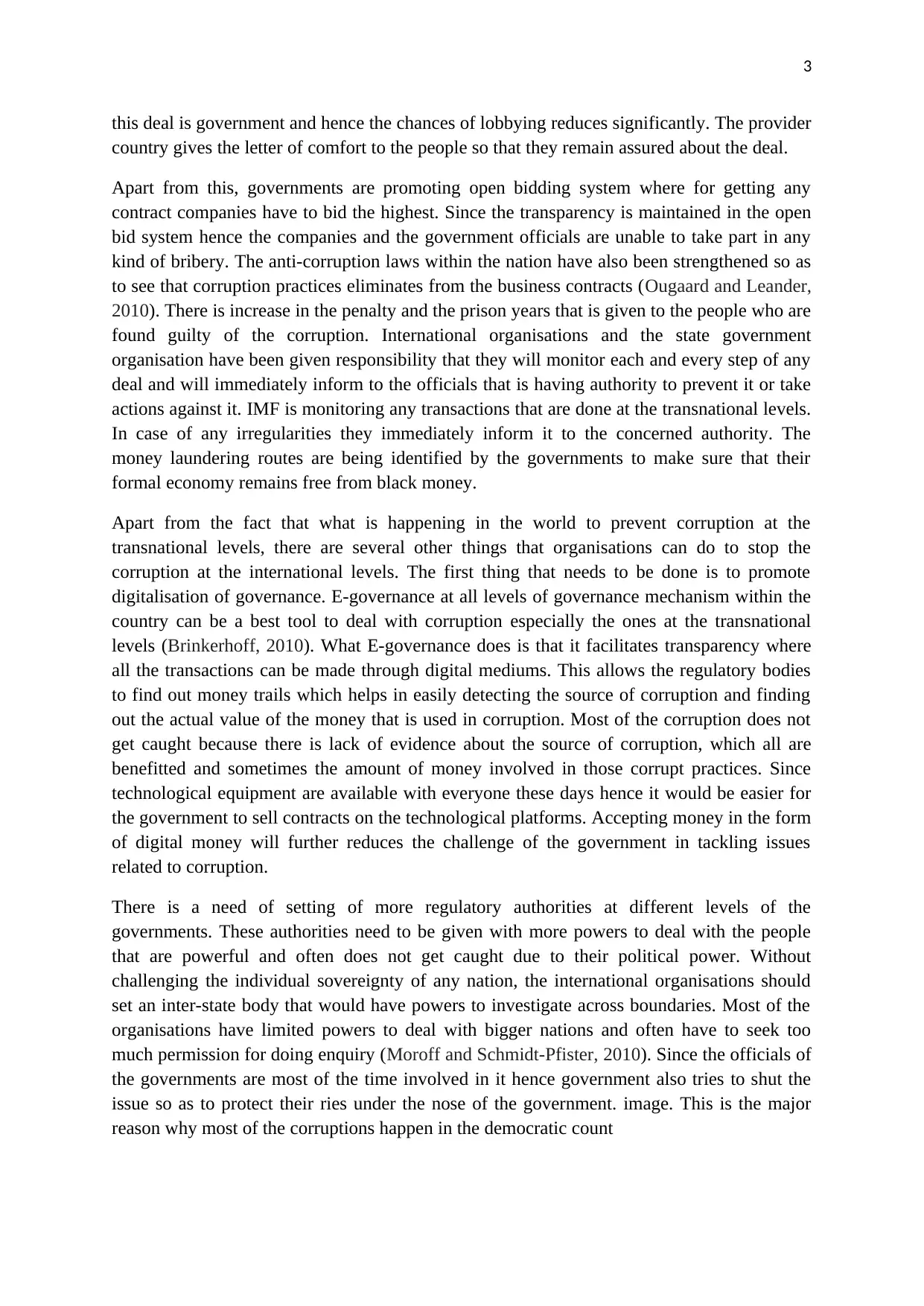
3
this deal is government and hence the chances of lobbying reduces significantly. The provider
country gives the letter of comfort to the people so that they remain assured about the deal.
Apart from this, governments are promoting open bidding system where for getting any
contract companies have to bid the highest. Since the transparency is maintained in the open
bid system hence the companies and the government officials are unable to take part in any
kind of bribery. The anti-corruption laws within the nation have also been strengthened so as
to see that corruption practices eliminates from the business contracts (Ougaard and Leander,
2010). There is increase in the penalty and the prison years that is given to the people who are
found guilty of the corruption. International organisations and the state government
organisation have been given responsibility that they will monitor each and every step of any
deal and will immediately inform to the officials that is having authority to prevent it or take
actions against it. IMF is monitoring any transactions that are done at the transnational levels.
In case of any irregularities they immediately inform it to the concerned authority. The
money laundering routes are being identified by the governments to make sure that their
formal economy remains free from black money.
Apart from the fact that what is happening in the world to prevent corruption at the
transnational levels, there are several other things that organisations can do to stop the
corruption at the international levels. The first thing that needs to be done is to promote
digitalisation of governance. E-governance at all levels of governance mechanism within the
country can be a best tool to deal with corruption especially the ones at the transnational
levels (Brinkerhoff, 2010). What E-governance does is that it facilitates transparency where
all the transactions can be made through digital mediums. This allows the regulatory bodies
to find out money trails which helps in easily detecting the source of corruption and finding
out the actual value of the money that is used in corruption. Most of the corruption does not
get caught because there is lack of evidence about the source of corruption, which all are
benefitted and sometimes the amount of money involved in those corrupt practices. Since
technological equipment are available with everyone these days hence it would be easier for
the government to sell contracts on the technological platforms. Accepting money in the form
of digital money will further reduces the challenge of the government in tackling issues
related to corruption.
There is a need of setting of more regulatory authorities at different levels of the
governments. These authorities need to be given with more powers to deal with the people
that are powerful and often does not get caught due to their political power. Without
challenging the individual sovereignty of any nation, the international organisations should
set an inter-state body that would have powers to investigate across boundaries. Most of the
organisations have limited powers to deal with bigger nations and often have to seek too
much permission for doing enquiry (Moroff and Schmidt-Pfister, 2010). Since the officials of
the governments are most of the time involved in it hence government also tries to shut the
issue so as to protect their ries under the nose of the government. image. This is the major
reason why most of the corruptions happen in the democratic count
this deal is government and hence the chances of lobbying reduces significantly. The provider
country gives the letter of comfort to the people so that they remain assured about the deal.
Apart from this, governments are promoting open bidding system where for getting any
contract companies have to bid the highest. Since the transparency is maintained in the open
bid system hence the companies and the government officials are unable to take part in any
kind of bribery. The anti-corruption laws within the nation have also been strengthened so as
to see that corruption practices eliminates from the business contracts (Ougaard and Leander,
2010). There is increase in the penalty and the prison years that is given to the people who are
found guilty of the corruption. International organisations and the state government
organisation have been given responsibility that they will monitor each and every step of any
deal and will immediately inform to the officials that is having authority to prevent it or take
actions against it. IMF is monitoring any transactions that are done at the transnational levels.
In case of any irregularities they immediately inform it to the concerned authority. The
money laundering routes are being identified by the governments to make sure that their
formal economy remains free from black money.
Apart from the fact that what is happening in the world to prevent corruption at the
transnational levels, there are several other things that organisations can do to stop the
corruption at the international levels. The first thing that needs to be done is to promote
digitalisation of governance. E-governance at all levels of governance mechanism within the
country can be a best tool to deal with corruption especially the ones at the transnational
levels (Brinkerhoff, 2010). What E-governance does is that it facilitates transparency where
all the transactions can be made through digital mediums. This allows the regulatory bodies
to find out money trails which helps in easily detecting the source of corruption and finding
out the actual value of the money that is used in corruption. Most of the corruption does not
get caught because there is lack of evidence about the source of corruption, which all are
benefitted and sometimes the amount of money involved in those corrupt practices. Since
technological equipment are available with everyone these days hence it would be easier for
the government to sell contracts on the technological platforms. Accepting money in the form
of digital money will further reduces the challenge of the government in tackling issues
related to corruption.
There is a need of setting of more regulatory authorities at different levels of the
governments. These authorities need to be given with more powers to deal with the people
that are powerful and often does not get caught due to their political power. Without
challenging the individual sovereignty of any nation, the international organisations should
set an inter-state body that would have powers to investigate across boundaries. Most of the
organisations have limited powers to deal with bigger nations and often have to seek too
much permission for doing enquiry (Moroff and Schmidt-Pfister, 2010). Since the officials of
the governments are most of the time involved in it hence government also tries to shut the
issue so as to protect their ries under the nose of the government. image. This is the major
reason why most of the corruptions happen in the democratic count
Paraphrase This Document
Need a fresh take? Get an instant paraphrase of this document with our AI Paraphraser
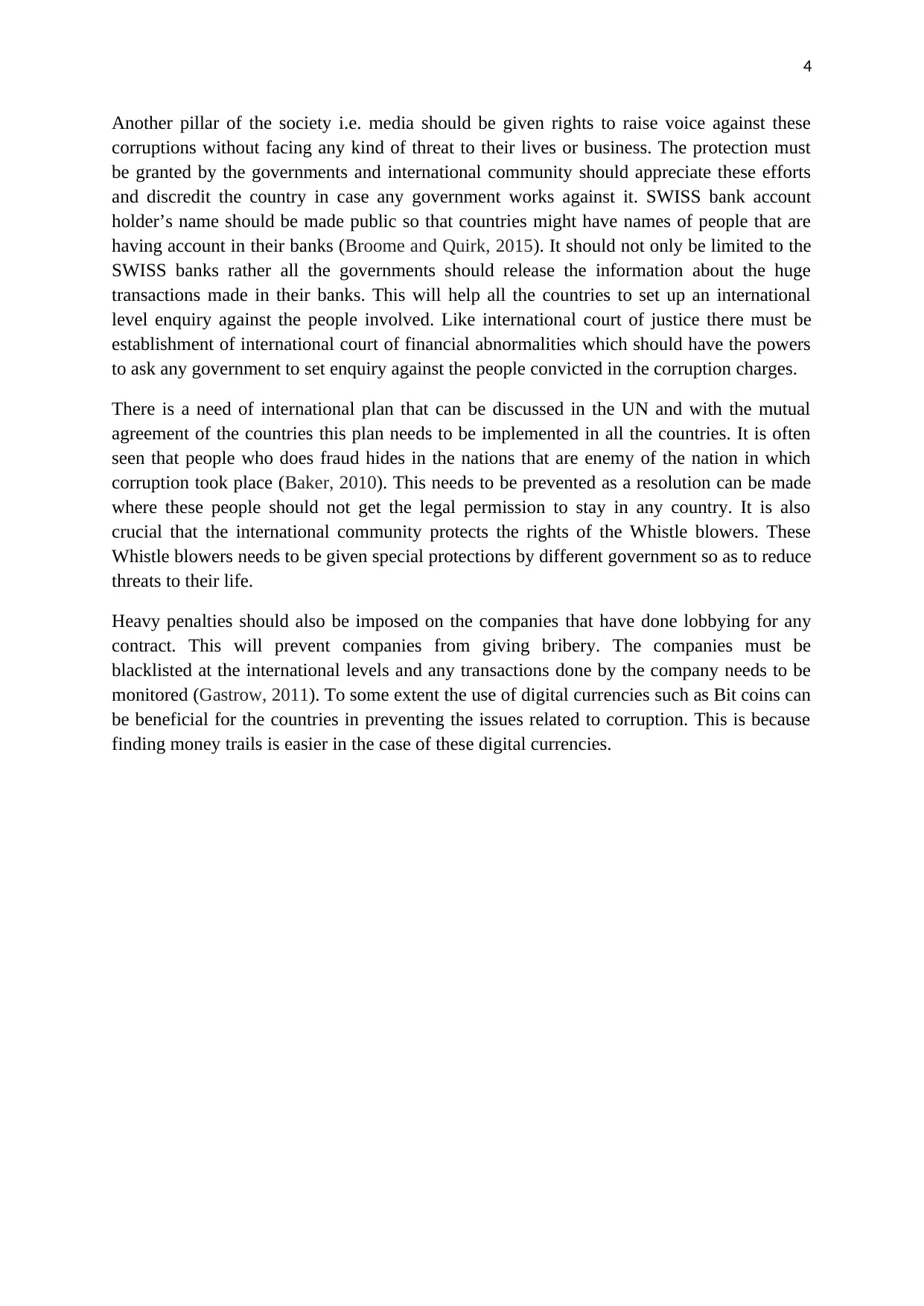
4
Another pillar of the society i.e. media should be given rights to raise voice against these
corruptions without facing any kind of threat to their lives or business. The protection must
be granted by the governments and international community should appreciate these efforts
and discredit the country in case any government works against it. SWISS bank account
holder’s name should be made public so that countries might have names of people that are
having account in their banks (Broome and Quirk, 2015). It should not only be limited to the
SWISS banks rather all the governments should release the information about the huge
transactions made in their banks. This will help all the countries to set up an international
level enquiry against the people involved. Like international court of justice there must be
establishment of international court of financial abnormalities which should have the powers
to ask any government to set enquiry against the people convicted in the corruption charges.
There is a need of international plan that can be discussed in the UN and with the mutual
agreement of the countries this plan needs to be implemented in all the countries. It is often
seen that people who does fraud hides in the nations that are enemy of the nation in which
corruption took place (Baker, 2010). This needs to be prevented as a resolution can be made
where these people should not get the legal permission to stay in any country. It is also
crucial that the international community protects the rights of the Whistle blowers. These
Whistle blowers needs to be given special protections by different government so as to reduce
threats to their life.
Heavy penalties should also be imposed on the companies that have done lobbying for any
contract. This will prevent companies from giving bribery. The companies must be
blacklisted at the international levels and any transactions done by the company needs to be
monitored (Gastrow, 2011). To some extent the use of digital currencies such as Bit coins can
be beneficial for the countries in preventing the issues related to corruption. This is because
finding money trails is easier in the case of these digital currencies.
Another pillar of the society i.e. media should be given rights to raise voice against these
corruptions without facing any kind of threat to their lives or business. The protection must
be granted by the governments and international community should appreciate these efforts
and discredit the country in case any government works against it. SWISS bank account
holder’s name should be made public so that countries might have names of people that are
having account in their banks (Broome and Quirk, 2015). It should not only be limited to the
SWISS banks rather all the governments should release the information about the huge
transactions made in their banks. This will help all the countries to set up an international
level enquiry against the people involved. Like international court of justice there must be
establishment of international court of financial abnormalities which should have the powers
to ask any government to set enquiry against the people convicted in the corruption charges.
There is a need of international plan that can be discussed in the UN and with the mutual
agreement of the countries this plan needs to be implemented in all the countries. It is often
seen that people who does fraud hides in the nations that are enemy of the nation in which
corruption took place (Baker, 2010). This needs to be prevented as a resolution can be made
where these people should not get the legal permission to stay in any country. It is also
crucial that the international community protects the rights of the Whistle blowers. These
Whistle blowers needs to be given special protections by different government so as to reduce
threats to their life.
Heavy penalties should also be imposed on the companies that have done lobbying for any
contract. This will prevent companies from giving bribery. The companies must be
blacklisted at the international levels and any transactions done by the company needs to be
monitored (Gastrow, 2011). To some extent the use of digital currencies such as Bit coins can
be beneficial for the countries in preventing the issues related to corruption. This is because
finding money trails is easier in the case of these digital currencies.
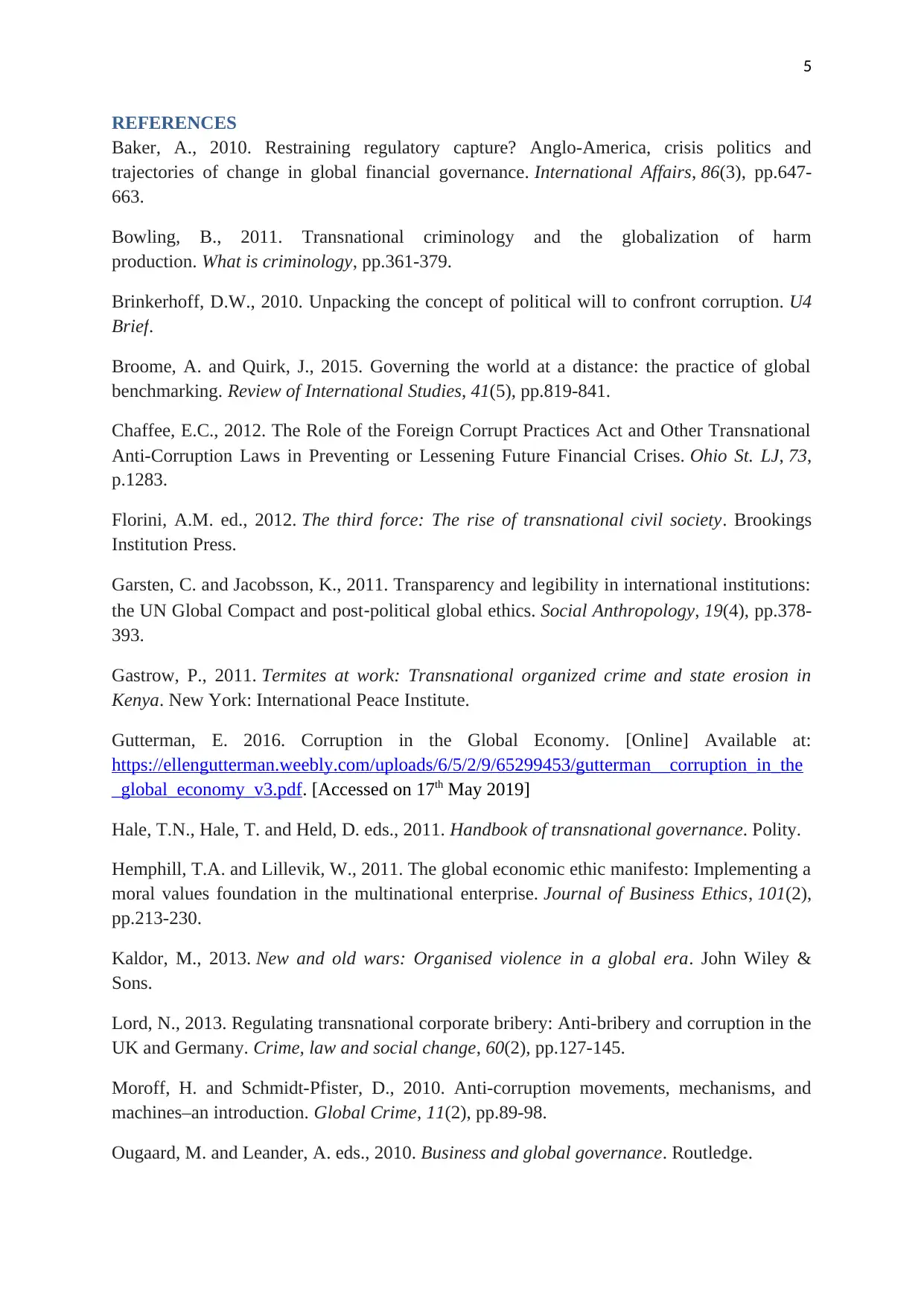
5
REFERENCES
Baker, A., 2010. Restraining regulatory capture? Anglo-America, crisis politics and
trajectories of change in global financial governance. International Affairs, 86(3), pp.647-
663.
Bowling, B., 2011. Transnational criminology and the globalization of harm
production. What is criminology, pp.361-379.
Brinkerhoff, D.W., 2010. Unpacking the concept of political will to confront corruption. U4
Brief.
Broome, A. and Quirk, J., 2015. Governing the world at a distance: the practice of global
benchmarking. Review of International Studies, 41(5), pp.819-841.
Chaffee, E.C., 2012. The Role of the Foreign Corrupt Practices Act and Other Transnational
Anti-Corruption Laws in Preventing or Lessening Future Financial Crises. Ohio St. LJ, 73,
p.1283.
Florini, A.M. ed., 2012. The third force: The rise of transnational civil society. Brookings
Institution Press.
Garsten, C. and Jacobsson, K., 2011. Transparency and legibility in international institutions:
the UN Global Compact and post‐political global ethics. Social Anthropology, 19(4), pp.378-
393.
Gastrow, P., 2011. Termites at work: Transnational organized crime and state erosion in
Kenya. New York: International Peace Institute.
Gutterman, E. 2016. Corruption in the Global Economy. [Online] Available at:
https://ellengutterman.weebly.com/uploads/6/5/2/9/65299453/gutterman__corruption_in_the
_global_economy_v3.pdf. [Accessed on 17th May 2019]
Hale, T.N., Hale, T. and Held, D. eds., 2011. Handbook of transnational governance. Polity.
Hemphill, T.A. and Lillevik, W., 2011. The global economic ethic manifesto: Implementing a
moral values foundation in the multinational enterprise. Journal of Business Ethics, 101(2),
pp.213-230.
Kaldor, M., 2013. New and old wars: Organised violence in a global era. John Wiley &
Sons.
Lord, N., 2013. Regulating transnational corporate bribery: Anti-bribery and corruption in the
UK and Germany. Crime, law and social change, 60(2), pp.127-145.
Moroff, H. and Schmidt-Pfister, D., 2010. Anti-corruption movements, mechanisms, and
machines–an introduction. Global Crime, 11(2), pp.89-98.
Ougaard, M. and Leander, A. eds., 2010. Business and global governance. Routledge.
REFERENCES
Baker, A., 2010. Restraining regulatory capture? Anglo-America, crisis politics and
trajectories of change in global financial governance. International Affairs, 86(3), pp.647-
663.
Bowling, B., 2011. Transnational criminology and the globalization of harm
production. What is criminology, pp.361-379.
Brinkerhoff, D.W., 2010. Unpacking the concept of political will to confront corruption. U4
Brief.
Broome, A. and Quirk, J., 2015. Governing the world at a distance: the practice of global
benchmarking. Review of International Studies, 41(5), pp.819-841.
Chaffee, E.C., 2012. The Role of the Foreign Corrupt Practices Act and Other Transnational
Anti-Corruption Laws in Preventing or Lessening Future Financial Crises. Ohio St. LJ, 73,
p.1283.
Florini, A.M. ed., 2012. The third force: The rise of transnational civil society. Brookings
Institution Press.
Garsten, C. and Jacobsson, K., 2011. Transparency and legibility in international institutions:
the UN Global Compact and post‐political global ethics. Social Anthropology, 19(4), pp.378-
393.
Gastrow, P., 2011. Termites at work: Transnational organized crime and state erosion in
Kenya. New York: International Peace Institute.
Gutterman, E. 2016. Corruption in the Global Economy. [Online] Available at:
https://ellengutterman.weebly.com/uploads/6/5/2/9/65299453/gutterman__corruption_in_the
_global_economy_v3.pdf. [Accessed on 17th May 2019]
Hale, T.N., Hale, T. and Held, D. eds., 2011. Handbook of transnational governance. Polity.
Hemphill, T.A. and Lillevik, W., 2011. The global economic ethic manifesto: Implementing a
moral values foundation in the multinational enterprise. Journal of Business Ethics, 101(2),
pp.213-230.
Kaldor, M., 2013. New and old wars: Organised violence in a global era. John Wiley &
Sons.
Lord, N., 2013. Regulating transnational corporate bribery: Anti-bribery and corruption in the
UK and Germany. Crime, law and social change, 60(2), pp.127-145.
Moroff, H. and Schmidt-Pfister, D., 2010. Anti-corruption movements, mechanisms, and
machines–an introduction. Global Crime, 11(2), pp.89-98.
Ougaard, M. and Leander, A. eds., 2010. Business and global governance. Routledge.
⊘ This is a preview!⊘
Do you want full access?
Subscribe today to unlock all pages.

Trusted by 1+ million students worldwide
1 out of 6
Related Documents
Your All-in-One AI-Powered Toolkit for Academic Success.
+13062052269
info@desklib.com
Available 24*7 on WhatsApp / Email
![[object Object]](/_next/static/media/star-bottom.7253800d.svg)
Unlock your academic potential
Copyright © 2020–2026 A2Z Services. All Rights Reserved. Developed and managed by ZUCOL.





